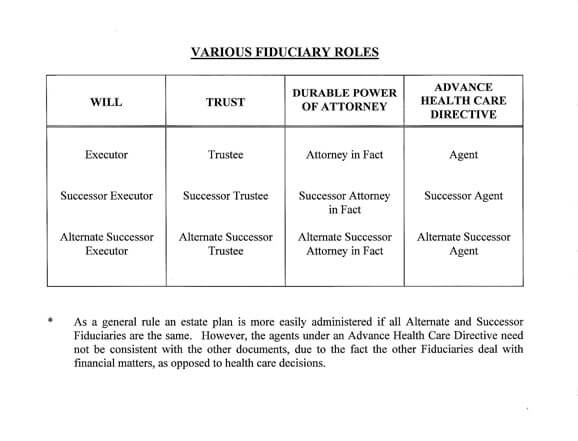Fiduciary Roles
The following grid is designed to help clients understand the various fiduciary role of individuals or institutions appointed to administer an estate plan, now as well as after death. The term “fiduciary” refers to an individual or institution who acts on behalf of another individual, for the benefit of that individual. A fiduciary cannot act in his or her own behalf or it is breach of its duties.
- Revocable Living Trust: The individual or institution appointed to administer a Trust is called the Trustee. In most cases, you can serve as your own Trustee. However, if you cannot serve as the Trustee, then you need to appoint a Successor Trustee and an Alternate Successor Trustee.
- Pour-Over Will: The individual or institutions appointed to administer a Will is the Executor. If he or she cannot serve as the Executor, then you need to appoint an Alternate Executor and an Alternate Successor Executor.
- Durable Power Of Attorney: The individual appointed to act as your agent under a Durable Power of Attorney is called the Attorney in Fact. The Attorney in Fact need not be an attorney at law. The Attorney in Fact has the authority to manage assets not titled in your Trust. In addition, a Durable Power of Attorney terminates immediately at your death. In the event your Attorney in Fact cannot serve, you will need to appoint a Successor Attorney in Fact and an Alternate Successor Attorney in Fact.
- Advance Health Care Directive: The Advance Health Care Directive isdesigned to grant to another individual the authority to cease artificial life support, if you can no longer make health care decisions for yourself. The person with such authority is called your Agent. You may not have Co-Agents under an Advanced Health Care Directive. In the event that individual cannot serve as your Agent, then you will need to appoint an Alternate Agent and a Successor Alternate Agent. Please understand the Advance Health Care Directive becomes effective if you are terminally ill and can no longer make health care decision for yourself. In conclusion, as a general rule, all of the above documents are revocable in nature. In other words, they can be changed, modified, or revoked.

